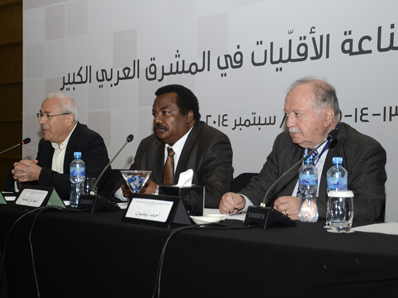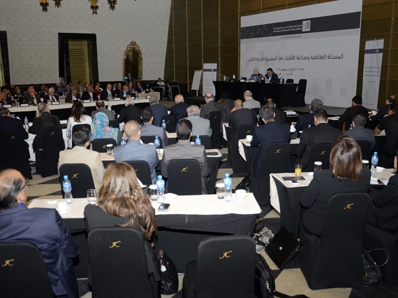 |
| ACRPS General Director Azmi Bishara presented by Dr Taher Kanaan at the opening of our Third Annual Conference on Issues of Democratic Governance. |
The Third Annual Conference on Issues of Democratic Governance, which in 2014 focuses on political sectarianism in the Arab region, opened on Friday, September 13 at Jordan’s Dead Sea. The three-day meeting brings together more than 100 scholars from across the Arab region to deliberate on the question of political sectarianism, of immediate and urgent relevance to the future of all of the individual Arab states and the broader Arab collective. Illustrating the urgency of the question facing the congregated scholars, ACRPS General Director Azmi Bishara tied the meeting’s proceedings to contemporaneous events, by pointing to the group known as the Islamic State in Iraq and Syria (ISIS), as the “catastrophic logical conclusion” of sectarianism. ISIS and similar groups, Bishara noted, had been able to employ a “selective and out-of-context” reading of Islamic texts and history to pursue their aims, and thereby force others to engage in a debate on their purported Islamic legitimacy. Yet the triumph of ISIS and other political movements driven by political sectarianism was not an inevitability. There is, according to Bishara, an alternative: a broadly defined Arab nationalism founded on democracy.
Bishara opened his address by expanding on an increasingly common mantra on sectarianism: while “sectarianism in its contemporary usage within common Arab discourse”--as a chauvinistic attachment felt towards an individual’s imagined religious community--was a modern concept, this did not imply that either religious sects or chauvinism were modern innovations. According to Bishara, the idea of a sectarian groupings as communitieswhich had the right to demand concessions from the state(s) which hosted them was born only with the emergence of the nation-state, but this happened prior to the effective independence of states in the Arab region. Commenting further still on contemporary discourse, Bishara contrasted present-day political sectarianism with the Ottoman millet system. While the former was based on the institutionalization, to varying degrees, of sectarian identities, the Ottomans’ millet system had been an organizational framework that had never sought to regulate the distribution of political power according to sectarian lines. Contemporary Arab political sectarianism, commented Bishara, was also potent because of the promise which it held out for wide swathes of the population: by identifying and showing a sense of solidarity with the social elites of their own sects, otherwise disenfranchised masses could enjoy political influence. In other cases, noted Bishara, political sectarianism was cloaked in the guise of egalitarian movements within specific religious sects, a clear allusion to the modern history of Lebanon.
Yet such seemingly democratic urges presented an obstacle to the rise of democracy within individual Arab states and also across the broader Arab collective: by policing sectarian boundaries, political sectarianism had created a system fundamentally at odds with the individual choice available through a politically pluralist, liberal democracy. “I personally have no doubt”, Bishara added, “that the two historical trends antithetical to political sectarianism are the rise of Arabism—and this is here a common Arab politico-cultural identity, before such an identity was encumbered by the authoritarian ideologies used to justify ruling regimes—and the rise of the local nation-states which sought, with the construction of national institutions transcendent of parochial identity groups”. Interestingly, Bishara here places the emergence of nation-states within the Arab context, with the borders and patriotic sentiment which each entails, as complementary to a common pan-Arab national identity, and not in conflict with it. Bishara enunciated unequivocally that there had yet to be any “substitute for a national culture based on a shared language, and a nation-state founded on citizenship and the equality of social and political rights as means to social integration” as a means to combatting “the fragmentation of society into a patchwork of tribal, parochial or religious sectarian and confessional groupings, relations between which fluctuate between conflict and coexistence, and that could potentially become the basis of political conflicts.”
Burhan Ghalioun Weighs in with the Syrian Experience
 |
| From left to right: Burhan Ghalioun, Alsadek Al Faqih and Ahmad Beydoun. |
Dr. Bishara’s comments were followed by an address by well-known Syrian opposition figure and academic, Burhan Ghalioun. Ghalioun, an author on the question of sectarianism, religious minorities and democracy in the Arab world, used his address to speak specifically to the Syrian experience. Ghalioun pointed out how the current conflict in Syria, which saw a popular rebellion by wide swathes of the population crushed with brutal force by a government composed largely of a minority religious group, resulted in a situation where, for the first time, Sunni Muslims came to be self-conscious of their confessional identity as Sunnis. In other words, said Ghalioun, the failure of the nation-state in the Arab region and its inability to protect individuals from oppression and injustice, meant that religious sects were literally being born as the convened scholars were speaking, and as one form of many sub-national groupings that were competing to take the place of nation-states and demand loyalty from the people of the Arab region.
The meetings within the conference will continue over Sunday, 14 and Monday, 15 September, and will conclude with a roundtable discussion on the role of Arabism and nation-states as a means to combatting social fragmentation and political sectarianism.
 |
| Our conference on sectarianism was attended by over 120 scholars from across the Arab region. |
Visit the event page for more details of the meeting; extensive conference materials, including a complete program and the abstracts of submitted papers, can be found at the event’s Arabic page. The conference proceedings will be tweeted live in English: @ArabCenter_en and Arabic: @ArabCenter_ar